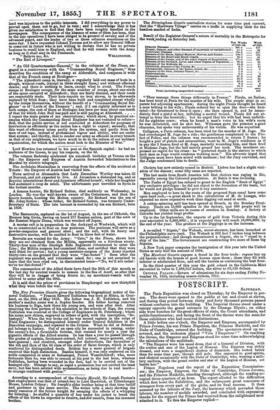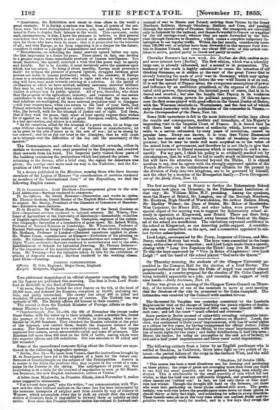POSTSCRIPT.
SATURDAY.
The Paris Exposition was closed on Thursday, by the Emperor in per- son. The doors were opened to the public at ten and closed at eleven, and during that period between thirty and forty thousand persons passed without confusion into the building. The Imperial throne stood under a canopy opposite the grand entrance by the Champs Elysee ; on either side were benches for the great officers of state, the Court attendants, and public functionaries; and facing the front of the throne were the seats for those exhibitors who had received distinctions.
A little before one o'clock, the Emperor and Empress, accompanied by Prince Jerome, his son Prince Napoleon, the Princess Mathilde, and the Duke of Cambridge, entered the building. The spectators stood up un- covered, and the orchestra played "Viva l'Empereur!" On reaching the throne, the Emperor and Empress stood for some time acknowledging the salutations of the multitude.
"The Emperor wore his usual dress, that of a General of Division, with the cordon and star of the Legion of Honour. The Empress was richly dressed, and wore a magnificent diadem of diamonds. She looked better than for some time past, though still pale. She appeared in good spirits, and chatted occasionally with the Duke of Cambridge, who, wearing a mili- tary uniform, with the grand cordon and star of the Legion of Honour, sat beside her."
Prince Napoleon read the report of the Exposition Commission- era; the Emperor, Empress, the Duke of Cambridge, Prince Jerome, and the Princess Mathilde, standing throughout, although the reading oc- cupied three-quarters of an hour, The report alluded, to the difficulties which first beset the Exhibition, and the subsequent great concourse of strangers from every part of the globe, and its final success. It then summed up the labours of the Jury, the harmony which pervaded those labours, the number of medals awarded, and concluded with expressing thanks for the support the Prince had received from the enlightened men attached to it. To this the Emperor replied- " Gentlemen, the Exhibition now- about to does offers to the world a great example. It is daring, movie's war that, from all points of the uni- verse, men the most distinguished in science, arts, and industry, have has- tened to Paris to display their labours to We world. This concourse, under such circumstances, is dna, I-have thepleassne• to believe, to that general conviction that the war which is now carried!on is attended with-no-danger- save for those who have been its cause ; that it is prosecuted for the interests of all; and that Europe, so far from regarding it as a danger for the.future, considers it rather as a pledge of independence and security. " Nevertheless, on beholding the many marvels spread before our eyes, the first impression is a -desire for peace. Peace alone, in fact, can develop to a greater degree these remarkable products of- human intelligence. You must; therefore, like myself, entertain a wish that this peace may be speedy and durable. But to be durable, it must decisively solve the questionupon which war bee arisen. To bring it about speedily, Europe must pronounce itself.: for without the pressure of general opinion, struggles between great powers are liable to become protracted; while,, on. the contrary, if Europe comes to a. determination to declare who is right and who is wrong, a great step, will have been made towards arriving at a solution. At the period of civilization at which we have arrived, .military successes, however brilliant they may be, only bring about temporary results. Ultimately, the decisive victory is always won by public opinion. All of you, therefore, who think that the progress of the agriculture, industry, and, commerce of. am:L=0AS n eontributes to the welfare of alllhe others—who. think that the more. mu- tual relations are multiplied; We more national prejudices tend to. disappear —tell'your countrymen, when you return to the land of your birth, that- Franco entertains hatred against= nation; that she sympathizes with all who, like herself, wish for.the triumph of. justice and of right. Tell thentr, thatif they wish for peace, . they must- at-least:openly exprmatheir wishes. for or spinet ue.: for in. the midst of a great European. con.t,„ indifference, is a bad speculation, and silenceleamistake.. " As for ourselves, allied.for the triumph of a- great cause, let. us forge our anus without slackening the labour of- our furnaces or manufactures; let us be great in the arts of peace as- in the- arts of war ; let ins be strong by our concord ; and let-us put-our-trust in the Almighty that- he will: cause us to-triumph over the. diMculties of the day and the uncertainty of the: raorrove' The- Commissioners: and others .who had. obtained. rewards,. eitherit. medals or decorations, were neat presented to the Emperor, and received, their rewards from:hie:hand. The Imperial party visited those parts of- the building containing the productions windy had gained the prizes. On returning to the throne, after a brief stay; the, signal for departure wear given ; the cortege once more took-itit way to the Tuileries; and the Ex- position- of -1855 was closed.
In a decree published in the Moniteur, naming those-who have become- members ofth'e Legion oi.Honour"iir consideration of services rendered u members of the International Jury" of the Exposition, we find the following English names.
FOREIGN JIINY.
To be Commanders. Lord Hertford—Encouragement given to- the arts: Lord Ashburton—Services rendered to-commerce.
To be* Officers. Sir- David Brewster—Diseoveries. and works• in optics., Mr. Thomas- Graham, Grand Master of the English-Mint—Services renderede to science. Mr. Basle , President.of the Chamber -of Commerce of Manches- ter—Extensive. manufactures.. To be Enights, Sir William,Hooker, Director of the- Royal Gardens at Kew—Important services rendered to natural sciences. Mr. Wilson., Pro- fesaor-of Agriculture at the University-ofEdinburgh—Remarkable collection of English agricultural production& Mr. Crampton, engineer of the subma- rine telegraph—Invention of a locomotive of great speed. Mr. Robert Willis, ; Professor of Natural Sciences at Cambridge. Mr. Wheatstone, Professor of Natural Philosophy, at King's College—Application of the electric telegraph. Mr. Hoffman, Professor in London—Chemical operations applied to glass., Mr. Walter Crum, manufacturer at Glasgow—Perfection-of his printing on. cloth. Mr. Gibson--Services rendered to manufactures and commerce. Mr:. Digby Wyatt, architect—Services rendered to manufactures and to the arts;.' Establishment of Schools for,IndustrialfDrawing. Mr. Thomas Delarue- For the importance of his manufacture.of. paper, and his numerous inven- tion. Mr. Twining—For-the initiative taken by him fertile exhibition of articles- of domestic economy ; Services rendered to the working- classes. Lord. Ekho—Painting.
FOREIGN COMMISSIONERS.
qicers. H. Cole, England; Major Owen, England. Knight: Redgrave, England:



































 Previous page
Previous page